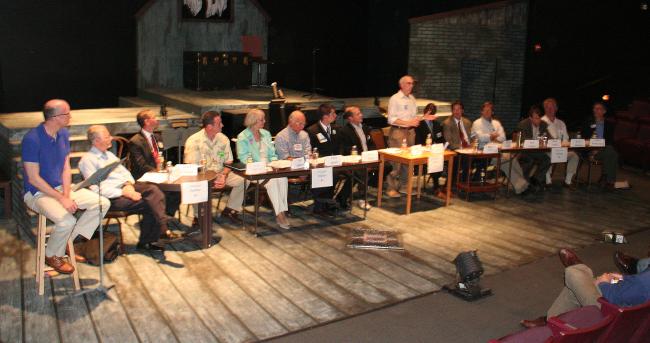City council candidates discuss West Seattle issues at forum
Fourteen city council candidates gathered at ArtsWest on July 21 to discuss important issues in West Seattle.
Wed, 07/22/2009
Candidates for Seattle City Council came together on July 21 to discuss issues specifically affecting West Seattle.
Candidates in attendance included:
Position 2: Richard Conlin, David Ginsburg.
Position 4: Tosh Tobin, Sally Bagshaw, David Bloom, Dorsol Plants.
Position 6: Marty Kaplan, Nick Licata.
Position 8: Bobby Forch, Jordan Royer, Mike O’Brien, David Miller, Rusty Williams, Robert Rosencrantz.
The forum started with a series of “lightning round” questions to which the candidates responded in support of or against specific issues. Their responses were as follows:
Candidates who support annexation of White Center and North Highline: Conlin, Bloom, O’Brien.
Candidates who oppose: Ginsburg, Tobin, Bagshaw, Plants, Kaplan, Forch, Royer, Miller, Williams, Rosencrantz.
Candidates who support parking meters in West Seattle: Obrien
All other candidates oppose.
Candidates who support expansion of the red light camera program: Conlin, Ginsburg, Kaplan, Royer, O’Brien, Miller, Williams, Rosencrantz.
Candidates who oppose: Tobin, Bagshaw, Bloom, Plants, Forch.
Candidates who support overturning Seattle’s head tax: Conlin, Ginsburg, Tobin, Bagshaw, Bloom, Kaplan, Forch, Royer, Miller, Williams, Rosencrantz.
Candidates who oppose: Plants ,O’Brien.
Candidates who support a deep-bore tunnel replacing the viaduct: Conlin, Bagshaw, Plants, Kaplan, Forch, Royer, Miller, Williams, Rosencrantz.
Candidates who oppose: Ginsburg, Tobin, Bloom, O’Brien.
Candidates were also asked how they would address the mobility needs of West Seattle if elected. Almost every candidate mentioned the incoming RapidRide service from King County Metro, as well as the importance of light rail systems.
Bagshaw and Bloom also encouraged more funding to be spent on the water taxi while Kaplan proposed that a street car could successfully connect the various business districts in West Seattle.
The candidates were also asked how the council could guide the various developments happening on former Huling Bros. lots to ensure that the neighborhood grows smartly.
“It’s an opportunity for us to build the 21st century urban village and do it right,” said Williams. He emphasized the importance of scale, open space and the inclusion of retail that “makes sense.”
O’Brien suggested creating a community that is less dependent on cars while Royer emphasized the importance of creating affordable housing.
In the second lightning round candidates continued to respond in support or against specific issues. Their responses were as follows:
Candidates who support a 20 cent fee on shopping bags: Conlin, Bloom, Plants, Kaplan, Licata, Forch, O’Brien, Miller, Williams.
Candidates who oppose: Ginsburg, Tobin, Bagshaw, Royer, Rosencrantz.
Candidates who support a new jail in Seattle: none
Candidates who oppose: all
Candidates who support multiple “tent cities”: Bloom, Plants, Kaplan, Licata, O’Brien, Miller, Williams, Ginsburg, Tobin, Bagshaw, Royer.
Candidates who oppose: Conlin, Forch, Rosencrantz.
When asked how to make Seattle a better city for small businesses, many candidates emphasized the importance of small businesses in the local economy, creating jobs and putting funds back in the local community. Most candidates also seemed to agree that the permitting process for small business owners should be streamlined and that taxes affecting them should be reviewed.
Bloom said that he would like to develop an office for developing small businesses. But other candidates emphasized a hands-off approach for city government.
“Government needs to get out of the way and let small businesses do what they need to do,” said Royer.
“Get out of our way,” added Williams, who has owned a small business for 40 years. “You are an impediment to our business. All government does is slow things down and cost us jobs in this town.”
Voters will elect city council members for these positions in the Nov. 3 election. The primary election is Aug. 18.


